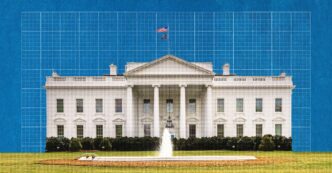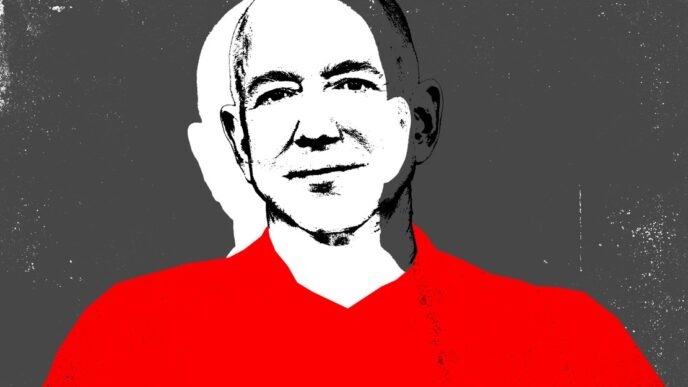Eduardo Daboin Rall, a detainee at ICE’s Bluebonnet facility, in Texas, thought he might never see his family again. The Venezuelan immigrant told NBC News that he was one of at least 28 men who were meant to be deported by the Trump administration.
“My fellow [detainees] are really afraid that we’ll be deported to El Salvador,” Daboin Rall told NBC News. “There’s no reason for why they’re doing it, and there’s even less reason because I haven’t had any sort of criminal record in my country nor in this country.”
This past Friday night, Daboin Rall was one of the detainees packed into ICE buses headed to the airport. Shortly afterward, the motorcade passed the exit for the airport, turned around, and went back to the facility. Meanwhile, a federal judge was telling a Trump-administration lawyer to “ensure no flights were deporting immigrants from Bluebonnet under the Alien Enemies Act on Friday night.”
Early Saturday morning, in response to an emergency petition from the ACLU warning that some men at the facility were in “imminent and ongoing jeopardy of being removed from the United States without notice or an opportunity to be heard,” the Supreme Court issued a 7–2 ruling blocking the administration from deporting any immigrants from the Northern District of Texas. The two dissenting justices were Samuel Alito and Clarence Thomas.
“I refused to join the Court’s order because we had no good reason to think that, under the circumstances, issuing an order at midnight was necessary or appropriate,” Alito wrote, in a dissent joined by Thomas. “Both the Executive and the Judiciary have an obligation to follow the law. The Executive must proceed under the terms of our order in Trump v. J. G. G., and this Court should follow established procedures.” What Alito and Thomas are asking for here is to allow normal legal processes to take their time, as though no costs would be incurred as time passed. But the law allows for extraordinary interventions under extraordinary circumstances, such as when human beings face the possibility of lifetime incarceration abroad without due process or hope of release if the Court doesn’t act swiftly. Given the imminent risk of irreparable harm, chiding the Court over improper procedure is curious at best.
“These are extraordinary circumstances. I’ve never seen circumstances more extraordinary,” Liza Goitein, a legal expert with the Brennan Center, told me. “I don’t think the ACLU needed to prove it beyond a reasonable doubt in order for the Court to determine that extraordinary relief was appropriate, especially given the Trump administration’s position that it can do nothing to obtain the return of people who are wrongly deported.”
As the legal scholar Stephen Vladeck writes in a post arguing that Alito’s objections to departures from procedure are mistaken, the dissent “bespeaks a justice who was grasping for ways to justify not granting the relief the applicants sought.” If the Court had done what Alito and Thomas wanted, the men in question could have been on their way to El Salvador’s notorious Terrorism Confinement Center, or CECOT—an apparently immutable fate, even when a person is sent there accidentally and the Supreme Court has ordered that person’s return. That appears not to have bothered Alito. The justice wrote that “no such deportations were then planned to occur either yesterday, April 18, or today, April 19,” but as Vladeck points out, what the Trump attorney actually said was that the administration reserves “‘the right’ to resume deportation flights as early as Saturday.” According to the ACLU, the men were given English-only notices identifying them as members of the Venezuelan gang Tren de Aragua and told to sign them or face imminent removal from the U.S.
The Roberts Court has sought to avoid direct confrontation with the Trump administration, but the administration’s insistence that it possesses a dictator’s prerogative to disappear people off the street and spirit them to CECOT has drawn the reluctant justices in. On April 7, the justices issued an order stating that the administration could not deport immigrants under the Alien Enemies Act, an archaic 18th-century law, without due process. Despite four justices dissenting over allowing the administration to continue the deportations, all nine signed opinions supported some form of due process for the detainees. (Although only foreign citizens can be deported under the act, the legal arguments the administration is making would allow Donald Trump to deport American citizens to El Salvador “by mistake” and make no effort to retrieve them.)
That’s what’s so baffling about Alito and Thomas’s objection. Even if you accept that the Court departed from procedure here, their position would have meant that the Court could not have ruled until it was too late to make a difference.
“Alito and Thomas, presumably, are willing to take the risk that while all these questions like what is ‘reasonable notice’ get hammered out in the lower courts, the government will not be deporting people in a way that circumvents the Court’s order,” Goitein told me. “It can certainly be inferred that because this is an extraordinary remedy, that the Court felt that there was an extraordinary risk that individuals might be deported in the near future.”
Proper procedure is important; it can ensure that all parties are treated equitably and prevent abuses of the legal process. Procedural objections are not by definition suspect or unreasonable—far from it. Yet Alito and Thomas’s decision to present the matter as an abstract inquiry rather than a live question that may result in people being imprisoned abroad indefinitely is an example of what could be called selective proceduralism—when justices insist on fidelity to or departure from proper procedure only when it benefits the causes they prefer politically.
Alito complains that the Court rushed its judgment, acting as though there were some sort of emergency, when in fact there was a genuine emergency, and the rushing was entirely justified. The administration has also flouted a Supreme Court order telling it to “facilitate” the return of Kilmar Abrego Garcia, a Maryland resident under a protective order who was sent to CECOT “in error.” Alito and Thomas must be aware that Abrego Garcia remains confined and that both Salvadoran President Nayib Bukele and Trump have pretended not to have the power to release him, joking about it in front of cameras in the Oval Office. Notably, the administration has also continued to stonewall a federal judge over disclosing information about what it is doing to obey the Supreme Court’s order to “facilitate” his release, even characterizing as “false” the idea that the Court had ordered it to do so. Sounds like it may need to hear that order again.
The most charitable interpretation is that Alito and Thomas are committed to following procedure at the expense of the rights of those the Trump administration is targeting, an example of what the Atlantic contributor Quinta Jurecic described as “a willingness to ignore the brute facts of Trump’s actions and their human cost in favor of remaining within the more comfortable world of high-minded detachment.”
There is also the more disconcerting possibility that Alito and Thomas understood that their position would have allowed the administration to continue with the Alien Enemies Act deportations without any meaningful due process, essentially ignoring the Court’s prior ruling, including the part that all nine justices were supposedly on board with. In this interpretation, the line about how the administration should “follow the law” was another classic Alito disclaimer, a denial of the implications of his stated position.
Alito and Thomas would have used selective proceduralism to allow Trump policies to become faits accomplis. Although not affirmatively supporting the Trump administration’s authority to disappear people to a foreign Gulag in the middle of the night without due process—not that anyone deserves that fate; the Eighth Amendment exists for a reason—the dissenter’s preferred outcome would nonetheless have allowed that to happen if the administration chose to exercise what it called its “right” to do so.
Selective proceduralism is probably unavoidable given ideological disagreements among the justices, but under these circumstances it takes on a sinister cast, a pantomime of the rule of law that acquiesces to Trump’s assertion of dictatorial powers inconsistent with the Constitution or with basic principles of due process and civil rights. It facilitates authoritarianism while pretending that laws still matter. If the Trump administration can get away with violating the Constitution because it knows the courts will be too slow to prevent it, then those constitutional rights simply no longer exist.














